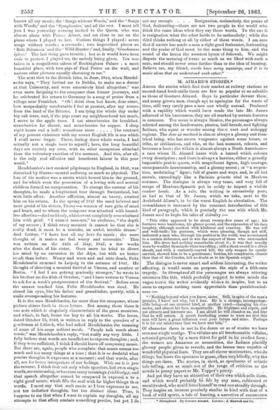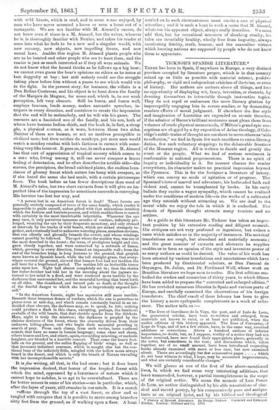M. AIMARD'S STORIES.* AMONG the stories which find their market
at railway stations or second-hand book-stalls there are few so popular or so saleable as those of Gustave Aimard. Boys in particular devour them, and many grown men, though apt to apologize for the waste of time, still very rarely pass a new one wholly unread. "Produced with a rapidity which would have made . the late Mr. James ashamed of his barrenness, they are all marked by certain features in common. The scene is always Mexico, the personages always selected among the landowners,. pirates, half-breeds, and fighting Indians, who squat or wander among those vast and unhappy regions. The dens ex machinti is almost always_ a gloomy and thea- trical being. who has sworn vengeance against some house, or
tribe, or civilization, and who, at the .last moment, relents, and becomes a hero ; the villain is almost always a North:American-7— a race whoni M. Aimard hates with a hatred which .colours
every description; and there is always a heroine, either a grandly impossible prairie queen, with magnificent figure, high courage,
unsurpassable horsemanship, and a gloomy secret ; or "a serpen- tine, undulating" figure, full -of graces- and ways, and, in all but
morals, exceedingly like a Parisian grisette clad in Mexican costume. The dialogue is always very:tame, and very full of scraps of Mexican-Spanish put in solely to impart a visible couleur locale. As a rule, the writing is excessively poor, as bad as that of Mr. James, which we take, next to Sir Archibald Alison's, to be the. worst English iu circulation. The resemblance is increased by the constant introduction of this kind of paragraph, which is precisely the one with which Mr.
James used to begin his tales of chivalry :—
" This rider appeared to be about twenty-five years of age ; features were handsome, his glance proud, and the expression of his face haughty, although marked with kindness and courtesy. He was tall and well-built';: this gestures, which were 'pleasing, though not stiff, indicated a man Who, through his positionitt the world, Was accustomed: to a certain deference, and to win the respect of those who surrounded him. Hia dress had nothing remarkable about it ; it was that usually
worn by wealthy Spaniards ; still a short sword in a silver sheath, and with a curionsly-:carved .hilt, the only weapon he openly carried, showed him to be a gentleman; besides; his complexion, clearer- than that of the Creoles, left no doubt as to his Spanish origin."
The dialogue is never smart and seldom interesting, the writer affecting, it would seem on purpose, the style of a fifth-rate tragedy. -In Stronghand all the personages are always -uttering sentences like this which probably suggest to some minds the vague terror the writer evidently nishcs to inspire, but to us seem to express nothing more appreciable than 'pitizleheaded-
ness
Nothing beyond what you know, sister. Still, in spite of the man's proMise, I know not why, but I fear. He is a strange incomprehen- sible being—at one moment kind, at another ernel—ehLging his cha- racter, and almost his face, momentarily. Ho frightens and repels, and yet attracts and interests me. I am afraid lie will abandon us, and fear that he will return. A secret foreboding seems to warn me that this man will have a great influence over your future and mine. Perhaps.
it is for our misfortune that WO have met him.' " .
Of character there is not in the dozen or so of -stories we have seen one sin-gle vestige. The Villains'are all irredeemable villains, actuated generally by a mere thirst for gold in its crudest form the women are Amazons or nonentities, the Indians placidly gloomy people' given to reverie, and the heroes men capable of wonderful physical feats. They are all clever marionettes, who do things; but leave the spectator to guess, often very blindly, why the things are done. The stories, in . short, as specimens of artistic tale-telling, are as much out of the range of criticism as the novels in penny papers. or Mr. Tupper's poetry.
And yet they have an attraction of their own which sells them, and which would probably be felt by any man, cultivated pr
uncultivateds who could force himself to read one steadily through. They inspire an interest precisely similar in kind with.that of a
book of wild sports, a tale of hunting, a narrative of encounters
* Strosghand By Gustave Aimiwd. London : J. Maxwell and Co. with wild beasts, which is read, and in some sense enjoyed, by men who have never mounted a horse or seen a beast out of a menagerie. We are not familiar with M. Aitnard's career, do not know even if there is a M. Aimard, but the writer, whoever he is, is thoroughly familiar with Mexico, and takes his reader at once into what he feels to be a new and a singular world, with new scenery, new objects, new impelling forces, and new moral laws. Amidst this region M. Aimard plants people who are to be hunted and other people who are to hunt them, and the reader is just as much interested as if they all were animals. We do not know what the hound thinks as he follows up a big bear; we cannot even guess the bear's opinions on ethics as he torus at last doggedly at bay ; but still nobody could see the struggle taking place before him without a pause to see which would win in the fight. In the present story, for instance, the villain is a Don Rufino Contreras, and his object is to hunt down the family of the Marquis do Moguer, for some end, which is, to our weak perception, left very obscure. Still he hunts, and hunts well, employs bravoes, lends money, makes sarcastic speeches, in- trigues in every direction, and contrives to create the impression that the end will be melancholy, and lie will win his game. The rescuers are a banished son of the family, and his son, both of whom have become Indian chiefs, and the book is, in fact, a strug- gle, a physical contest, as it were, between those two sides. Neither of them are human, or act on motives perceptible to civilized men; but then neither do monkeys, yet most men would watch a monkey combat with both factious in earnest with some- thing very like interest. It goes on, too, in such a scene. M. Aimard has that sort of appreciation of tropical scenery which comes to a man who, living among it, still can never conquer a latent feeling of detestation, and he often describesits terrible side—the storms, the precipices, the broad calcined plains, the endless luxu- riance of gloomy forest which nature has hung with creepers, as if she hated the scene she had made, with a certain picturesque force. The book before us has fewer descriptions than most of M. Aimard's tales, but two short extracts from it will give an im- perfect idea of the impression he sometimes succeeds in conveying. His heroine has lost her way, and " A person lost in an American forest is dead ! These forests are generally entirely composed of trees of the same family, which render it impossible to gaide oneself, unless gifted with that miraculous intuition which the Indians and hunters possess, and which enables them to march with certainty in the most inextricable labyrinths. Wherever the eye may turn, it only perceives immense arcades of verdure, infinitely pro- longed, wearying the eye by their desperate monotony, and only crossed at intervals by the tracks of wild beasts, which are mixed strangely to- gether, and eventually lead to unknown watering places, nameless streams, that run silently and gloomily beneath the covert, and whose windings cannot possibly bo followed. The spot where the maiden was, was one of the most deserted in the forest ; the trees, of prodigious height and size, grew closely together, and were connected by a network of lianas, which, growing in every direction, formed an impassable wall; from the end of the branches hung, in long festoons to the ground, that greyish moss known as Spanish beard, while the tall straight grass, that every- where covered the ground, showed that human foot had not trodden the soil here for a lengthened period. The maiden felt an invincible terror seize upon her. Night had almost completely set in ; then the stories her foster-brother had told her in the morning about the jaguars re- turned to her mind in a flood, and were rendered more terrible by the darkness that surrounded her, and the mournful howling that burst forth on all sides. She shuddered, and turned pale as death at the thought of the fearful danger to which she had so imprudently exposed her-
self." • • "In the American forests, night has mysteries still more terrible. Beneath these immense domes of verdure, which the sun is powerless to pierce even at mid-day, and which remain constantly buried in an un- decided clear obscure, the darknosa may, so to speak, be felt ; nothing could produce a flash in this chaos, excepting, perhaps, the luminous eyeballs of the wild beasts, that dart electric sparks from the thickets. Here, night is truly the mistress; the darkness is peopled by the sinister denizens of the forest, whom the obscurity drives from their unknown hiding-places, and who begin their mournful prowling in search of prey. From each clump, from each ravine, issue confused sounds that have no name in human language; some clear and sharp, others hoarse and low, and others, again, resembling miawling, or sardonic laughter, are blended in a horrible concert. Then come the heavy foot- falls on the ground, and the sullen flapping of birds' wings, as well as that incessant indistinct murmur, which is nought else but the con- tinual buzz of the infinitely little, mingled with the hollow moan always heard in the desert, and which is only the breath of Nature travailing with her incomprehensible secrets."
It is fire writing, all that, in the bad sense ; but it does leave the impression desired, that horror of the tropical forest with which the mind, oppressed by a luxuriance of nature which it cannot hope to subdue, is so apt to be overwhelmed. There are far better scenes in some of his stories—one in particular, which, after the lapse of years, still remains in our minds. It is a march ruffians through the top of a vast forest, so close and so tangled with creepers that it is possible to move among branches sixty feet from the ground, as if walking upon a floor. A hunt carried on in such circumstances must excite a sort of physical attention ; and it is such a hunt in such a scene that M. Aimard, whatever his apparent object, always really describes. We must add that but for occasional accounts of shocking cruelty, his tales are invariably healthy, wholly free from impurity, always inculcating fidelity, truth, honour, and the masculine virtues which huuting nations are supposed by people who do not know them to appreciate.































 Previous page
Previous page